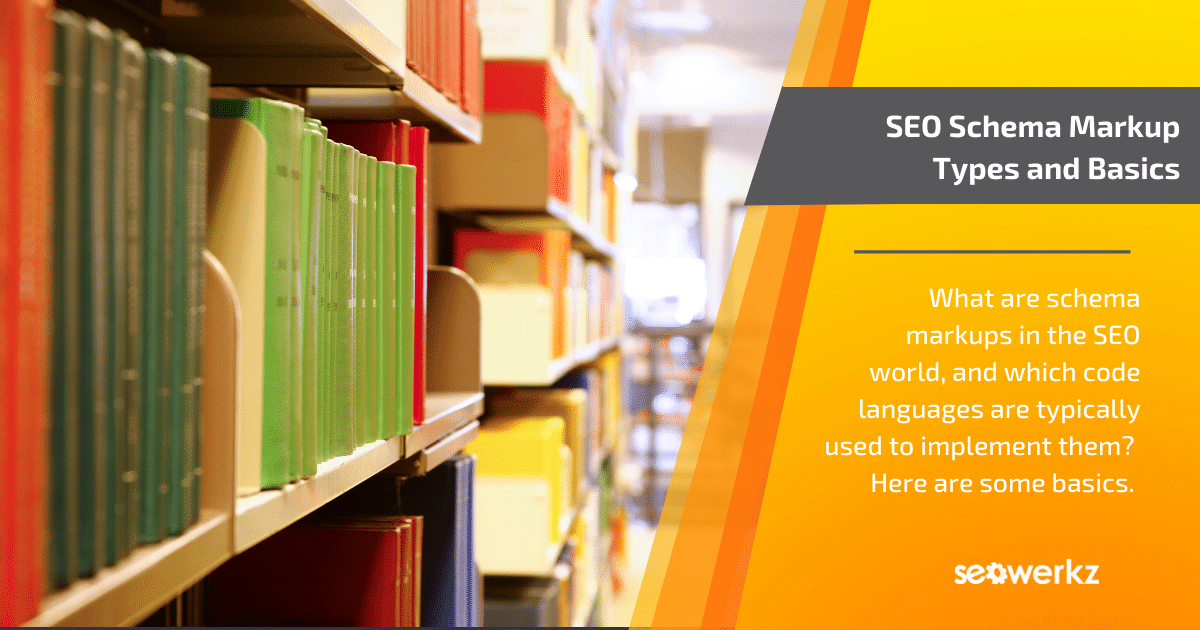SEO Schema Markup Basics, Types and Code Languages
August 25, 2022There are several back-end elements that may play a role in optimizing a given webpage or website for SEO, and one of these is known as schema, or schema markup. Housed specifically at the location schema.org, schema markups refer to forms of structured data that are used involving various types of encoding, helping improve the richness and detail of search results so search engines better understand the data and information on a given site.
At SEO Werkz, we’re happy to help with a wide range of search engine optimization services, including forms of structured data like schema markups and the important impact they may have on your site. What exactly are these markups, why and where are they commonly used, and what are the types of encoding languages (also called vocabularies) that can be used within these markups? Here’s a primer on everything you need to know.
Schema Markup Basics
As we noted above, a schema markup refers to a structured data vocabulary layered onto your site. The goal of this vocabulary is to help improve the way search engines like Google understand the information on your website – this, in turn, allows said engines to create richer, more detailed search results.
This is because, when utilizing schema markups, search engines don’t just see raw data. They see the relationships between various entities on your site, improving elements like your click-through rate (for organic results) and making the entire site make more sense.
Markup Types and Uses
So what’s included in the vocabulary that may be used within schema markups for your site? There are a variety of elements, including several different people, places and things. If you’re interested in the full list, it’s housed at schema.org at this link.
To get a bit more specific, schema markups are used for several common purposes today. These include articles, products, people, businesses, reviews, events, recipes and even medical conditions.
When a search engine views a site that has these markups included, it will generally display this information via the Rich Snippets section. Said snippets may include additional elements, such as dates for events, star ratings for reviews, and several other helpful elements that just add context and detail to the entire search experience.
Creative Works
While many parts of schema markup vocabulary are somewhat standard and straightforward, one area that deserves its own section is known as Creative Works. This refers to a vast library of different markups that’s in place for movies, music, books and even video games, offering highly specific and targeted details that relate back to the specific medium being used. For the “Book” markup, for instance, details used in the snippet might include book genre and age recommendations, book reviews, locations where the book is being sold nearby, and related elements.
Code Languages Used
Getting into the technical side of things just a bit, there are a few different code languages that can be used within schema markups. These will be added to your pages’ HTML code, enabling metadata on your document – and schema is a form of metadata. Here are some basics on each of these code languages and how they’re used:
- RDFa: Short for Resource Descriptive Framework in Attributes, RDFa is a form of code that can be added not just to HTML code, but also to XHTML and XML-based documents. It has a number of different attributes that might be utilized for the markup, including “about” (specifying the resource the metadata is describing), “content” (overriding the content of the element when the property attribute is being used), “datatype” (specifying the datatype for text used within the property attribute), “typeof” (specifying the RDF type to the subject or partner resource), “rel” and “rev” (noting relationship or inverse relationship, respectively, with another resource), and finally “src,” “href” and “resource” (all of which specify a partner resource for the markup).
- Microdata: Microdata is relatively similar to RDFa when it comes to implementation, though there are a few technical differences our SEO professionals will be happy to detail for you. They are also similar in attributes, though the microdata attributes come in different titles. They include “itemscope” (creating an item, plus indicating that the remainder of the element in question contains specific information about that item), “itemtype” (describing the specific properties, plus a valid URL, of a property), “itemid” (showing the identifier of the item, which is unique to each item), “itemprop” (confirming that the containing tag holds the value of a specific item property, such as name), and “itemref” (referencing properties of an element that are not contained in the itemscope, offering a list of element IDs with additional properties found somewhere else on the document).
- JSON-LD: Short for Javascript Object Notation for Linked Objects, JSON-LD is actually an annotation style that allows for direct pasting to the “head” or “body” tag of a given web document. Different attributes like “@context” and “@type” will be used to specify the exact schema vocabulary. This is generally considered the simplest code language to use for schema markups, and it’s one that’s often employed by those who are new to this world as they try to get the hang of it. In fact, even Google itself often recommends JSON-LD as the primary code format used for schema markups in general, not even just for beginners.
For more on how to utilize and implement schema markups for any of your pages, or to learn about any of our SEO, PPC, web design or other online marketing services, speak to the staff at SEO Werkz today.






